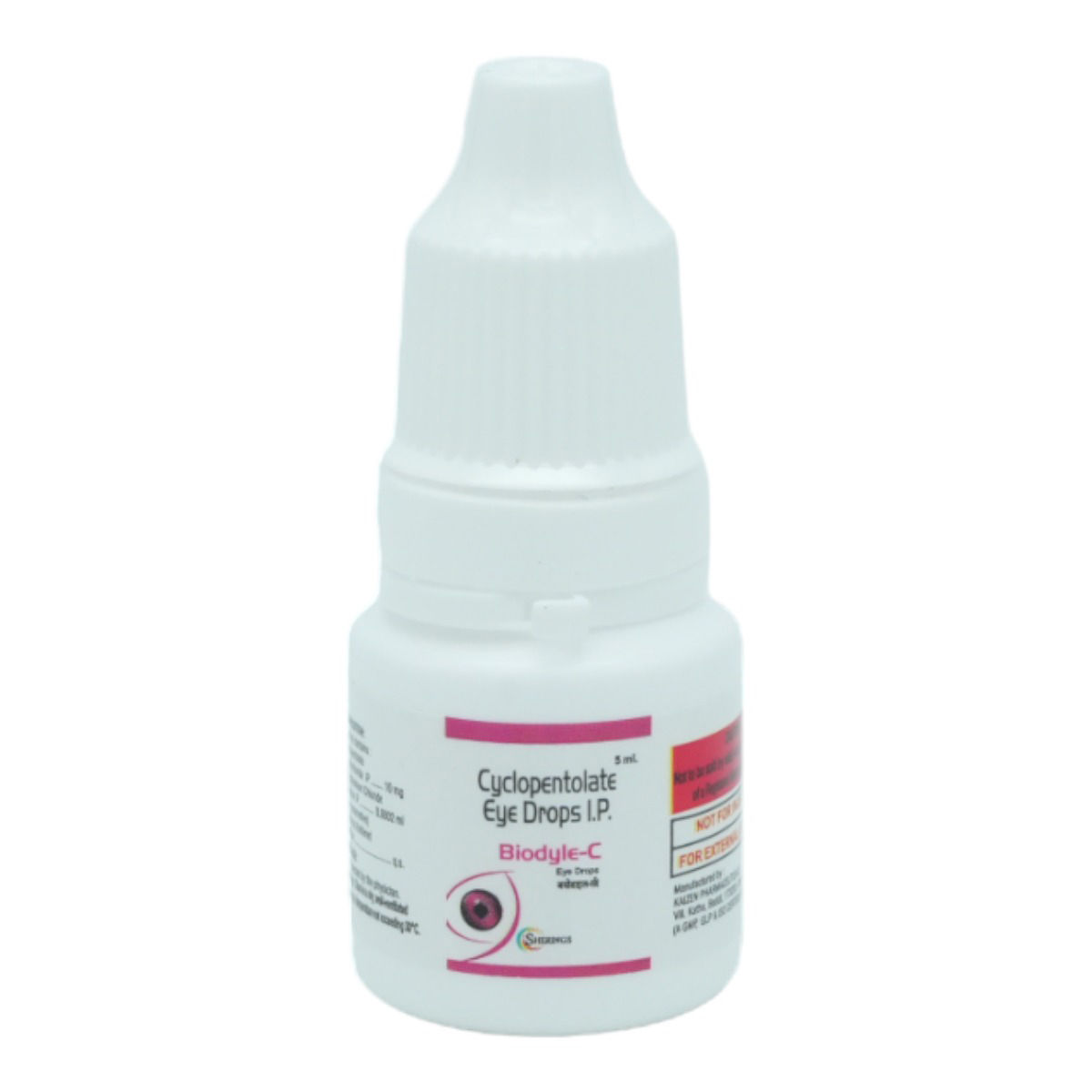Cyclopentolate
About Cyclopentolate
Cyclopentolate belongs to the class of ocular medications called mydriatic-anticholinergic, used to enlarge the pupil of the eye (preventing the eye from focusing) and to paralyse the lens temporarily before an eye examination or surgery. It is also used to treat eye inflammation (uveitis) and to reduce inflammation (including redness and swelling) after cataract surgery.
Cyclopentolate contains Cyclopentolate, which works by temporarily dilating (widening) the pupil of the eye and relaxing the muscles of the eye. It can also be prescribed to treat inflammation and pain within the eye. Cyclopentolate makes the pupil larger and relaxes the muscles in the eye, which reduces pain and allows the inflamed part of the eye to rest and recover.
Cyclopentolate is for external use only (in the eyes). Use Cyclopentolate as prescribed by your doctor. In some cases, you may experience eye irritation, a foreign body sensation in the eyes, blurred vision, eye itching, stinging, increased intraocular pressure, and a burning sensation in the eye. Most of these side effects of Cyclopentolate are temporary, do not require medical attention, and gradually resolve over time. However, if the side effects are persistent, reach out to your doctor.
Before using Cyclopentolate, inform your doctor if you are allergic to Cyclopentolate, have high pressure of the liquid inside the eye (closed-angle glaucoma), Down's syndrome, brain damage or spastic paralysis (in children), or have heart disease. Inform your doctor if you are pregnant or breastfeeding before using Cyclopentolate. Please consult your doctor if Cyclopentolate is to be used in children. Infants and young children may be more likely to experience side effects, such as behavioural disturbances, from Cyclopentolate. Caution is advised when using Cyclopentolate in the elderly, as they may be more sensitive to side effects, especially increased eye pressure. Cyclopentolate can cause blurred vision for up to 24 hours after using it. Be cautious if you drive or perform any activity that requires clear vision. This medication may also increase your sensitivity to light. Until the effects wear off, protect your eyes from the sun or bright light.
Uses of Cyclopentolate
• Pupil Dilation: Cyclopentolate dilates the pupils for comprehensive eye examinations.
• Uveitis Management: Cyclopentolate helps to manage uveitis by reducing pain and inflammation.
• Cycloplegia: Cyclopentolate temporarily paralyzes the ciliary muscles for accurate measurement of refractive errors.
• Diagnostic Procedures: Cyclopentolate facilitates diagnostic procedures like retinoscopy and fundus examination.
Medicinal Benefits
Cyclopentolate contains Cyclopentolate, which is an anticholinergic drug primarily used before eye examinations (refraction exams). Cyclopentolate works by temporarily dilating (widening) the pupil of the eye and relaxing the surrounding muscles. It can also be prescribed during the treatment of a condition called anterior uveitis. This is a painful eye condition caused by inflammation and pain within the eye. Cyclopentolate makes the pupil larger and relaxes the muscles in the eye, which reduces pain and allows the inflamed part of the eye to rest and recover.
Directions for Use
- Follow your doctor's instructions on the dosage and timing of this medication to ensure safe and effective use.
- Lie down and tilt your head backwards. Gently pull down your lower eyelid to create a pocket, and then insert the recommended number of drops as advised by your doctor. Close your eyes for 1-2 minutes.
- Cyclopentolate is for ophthalmic use only. Avoid touching the dropper's tip to avoid contamination.
Storage
Side Effects of Cyclopentolate
- Eye irritation
- Foreign body sensation in the eyes
- Blurred vision
- Itchy eye
- Stinging of eyes
- Increased intraocular pressure
- Burning sensation in the eyes
Drug Warnings
If you are allergic to Cyclopentolate or any other medicines, please tell your doctor. If you have high pressure of the liquid inside the eye (closed-angle glaucoma), Down's syndrome, brain damage or spastic paralysis (in children), or heart disease, inform your doctor before using Cyclopentolate. Please tell your doctor if you are pregnant or breastfeeding before starting Cyclopentolate. Cyclopentolate is not recommended for children below 28 days old as safety and effectiveness have not been established. Caution is advised when using Cyclopentolate in infants or small children and the elderly because they may be more sensitive to the side effects of this drug, especially increased pressure in the eye. Also, inform your doctor about all other medications you have been taking before using Cyclopentolate. Your doctor will instruct you to remove your contact lenses before administering the drops. Therefore, do not wear your contact lenses until the effects of the drops have completely worn off. After using Cyclopentolate, your vision may become temporarily blurred. So, do not drive or operate machinery until your vision is clear. Cyclopentolate may make your eyes more sensitive to light. Therefore, protect your eyes in bright light, and use dark sunglasses when outdoors.
Drug Interactions
Drug-drug interactions: Cyclopentolate interacts with a medicine used to treat dementia (donepezil), antipsychotics (clozapine), and cholinergic agonists (methacholine, acetylcholine ophthalmic, bethanechol, carbachol ophthalmic).
Drug-food interactions: No interactions found.
Drug-disease interactions: Cyclopentolate should not be used in patients with angle-closure glaucoma, Down's syndrome, brain damage or spastic paralysis (in children), or heart disease.
Drug-Drug Interactions Checker List:
Safety Advice

Alcohol
cautionCyclopentolate may cause interaction with alcohol. Therefore, avoid consumption of alcohol while using Cyclopentolate.

Pregnancy
cautionIt is unknown whether Cyclopentolate can be used in pregnancy. Hence, it should be taken only when prescribed by a doctor if he/she thinks the benefits outweigh the risks.

Breast Feeding
cautionIt is unknown whether Cyclopentolate passes into breastmilk. Please consult your doctor before taking Cyclopentolate if you are breastfeeding.

Driving
cautionCyclopentolate may cause temporary vision disturbances. So, it is recommended to avoid driving or operating machinery until your vision is clear.

Liver
consult your doctorLimited information is available regarding usage of Cyclopentolate in liver patients. Therefore, please consult the doctor if you have any concerns.

Kidney
consult your doctorLimited information is available regarding usage of Cyclopentolate in kidney patients. Therefore, please consult the doctor if you have any concerns.

Children
cautionCyclopentolate should be used in children with caution. However, it should not be used in children below 6 years of age.
Habit Forming
Diet & Lifestyle Advise
- Try to maintain good hygiene to keep your eyes clean and irritant-free.
- Do not rub your eyes even though some ophthalmic drugs make your eye itchy.
- Know your allergy triggers, such as pollen, dust and other factors.
- Sleep for at least six to eight hours to rejuvenate your eyes naturally.
- Wash your eyes with clean water at least twice a day.
- Manage stress, eat healthily, drink plenty of water, exercise regularly and get plenty of sleep.
- Wash your hands thoroughly, and do not touch the dropper before using drops to avoid contamination.
- Reduce screen time (by avoiding watching TV or phone) and use sunglasses while going into the sunlight.
Special Advise
- Protect your eyes in bright light, and use dark sunglasses when outdoors.
- Caution is advised when using Cyclopentolate in infants or small children and elderly patients, as they may be more sensitive to the side effects, especially mental/mood changes and increased pressure in the eye.
Patients Concern
Disease/Condition Glossary
Uveitis: Uveitis is an inflammation of the middle layer of the eye (uvea). The most common type is an inflammation of the iris, known as iritis (anterior uveitis). Symptoms include eye redness, pain and blurred vision.
FAQs
Cyclopentolate is used to dilate the pupil of the eye and to temporarily paralyse the lens before an eye examination or surgery. It is also used to treat eye inflammation after cataract surgery.
Cyclopentolate contains Cyclopentolate, which works by temporarily dilating (widening) the pupil of the eye and relaxing the muscles of the eye. It can also be prescribed to treat inflammation and pain within the eye.
Do not wear contact lenses while using Cyclopentolate. Wait at least until the effects of the drops have completely worn off before wearing the contact lenses.
The common side effects of Cyclopentolate are eye irritation, foreign body sensation in the eyes, blurred vision, eye itching, stinging, increased intraocular pressure, and burning sensation in the eye. These side effects are mild and temporary.
The Cyclopentolate may take approximately half an hour or more to take effect after it has been fully used. Effects may last for up to 24 hours, but the duration may vary depending on your disease condition.
Cyclopentolate may cause blurry vision for some time initially. Avoid driving and operating machinery in such cases until you feel better. If the effect persists longer, seek medical attention.
As a side effect, Cyclopentolate may produce hypertension or high blood pressure, so it is not known to cause low blood pressure. Therefore, if you have blood pressure-related problems, see your doctor before taking Cyclopentolate.
No, Cyclopentolate does not need to be refrigerated. It should be stored at room temperature, away from direct sunlight and heat, and tightly closed.
Yes, Cyclopentolate is safe for infants if it is used in the prescribed dose and duration. However, infants should not be fed for 4 hours after the installation of Cyclopentolate as it may increase the risk of side effects.
The frequency of using Cyclopentolate can be determined by the doctor based on your medical condition. Do not use Cyclopentolate more than the prescribed doses as it may cause side effects. Therefore, use Cyclopentolate exactly as prescribed by the doctor.
Cyclopentolate is used to assist manage pain and stop synechia, which is the adhesion of the iris to the cornea, in cases of microbial keratitis. Cyclopentolate is a mydriatic-anticholinergic medication that blocks acetylcholine's activity at smooth muscle parasympathetic locations. As a result, the pupil enlarges and the lens momentarily becomes immobile. Typically, cyclopentolate takes 30 to 60 minutes to start working.






